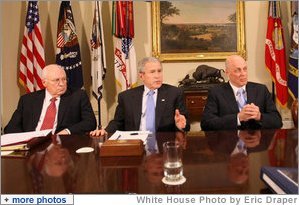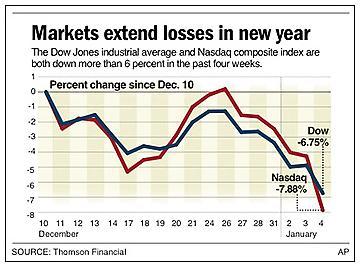- The so-called "free trade" agreements will still ban anti-offshoring policies.
- The so-called "free trade" agreements will still include NAFTA Chapter 11-style foreign investor rights. These rights encourage U.S. companies to move offshore, as well as open up basic U.S. environmental, health, zoning and other laws to attack (they allow a company to argue that a pro-labor or pro-consumer law constitute an unfair trade barrier and, therefore, needs to be eliminated).
- The threat to prevailing wage laws, recycled content and renewable energy policy remain.
- The agriculture rules that will foreseeably result in the displacement of millions of peasant farmers increasing hunger, social unrest, desperate migration and per Peruvian and Colombian government reports increased drug cultivation, trade and violence remain.
- The food safety limits that require us to import meat not meeting our safety standards remain
The Great
American Sell-Out
January 5, 2008
Then he gave the Republican conditioned response that was a complete non sequitur:
The Congress and the President have got to work together...make sure taxes remain low. If there are -- if the foundation is strong...the worst thing the Congress could do is raise taxes on the American people and on American businesses.
xxxx
Food prices Up
Gasoline Up
Job Growth Slowed
Home Values Declined
"Core Inflation Low"
"Solid Foundation"

"This economy of ours is on a solid foundation", Bush said in the press conference.
What precipitated the meeting was that the stock market took a dive on the jobs (lack of) report. Payrolls rose a paltry 18,000 jobs.
The funny part (not laughing) is that in November, George Bush gave a speech at a forum on International Trade and Investment in which he touted job growth and attributed it to "free and fair trade". Bush bragged about the fact that when he took office, the U.S. had only 3 "free trade" agreements - and thanks to his efforts, we now have 14 agreements (that are bleeding us dry).
Washington Post: Stocks Sink On Jobs Data; Tech Plummets
Economic Policy Institute: Job market flashing recession

Lou Dobbs Testifies to Congress on U.S. Trade Policy, 3/28/2007 (video)
Bush Speech at White House Forum
International Trade and Investment
November 6,
2007
The purpose of Bush's speech besides pandering to the multinational corporations and their trade associations was to promote the 'free trade' agreement with Peru.
But one very alert economist - Alan Tonelson, picked up a comment by the President of Peru and he reported it in an article titled, Peru's President Lays Bare the Big Lie at the Center of U.S. Trade Policy.
"Speaking to a U.S. Chamber of Commerce victory celebration before dashing to the White House to sign the U.S.-Peru free trade deal, Garcia urged the executives in the audience, “Come and open your factories in my country so we can sell your products back to the U.S.”
"Trade is also one of the driving forces behind the strength of our economy. Last week, we learned that our economy created 166,000 new jobs in October -- that's the 50th straight month of job growth. That's the longest period of uninterrupted job growth on record...
...In the long run, we know that more trade and investment expands opportunity, it raises the standard of living. But for the worker who has to change careers, it can be a painful experience. We have a responsibility to help workers. When a job goes overseas, some family hurts in America, and I understand that. And we can help, and that's why I believe in Trade Adjustment Assistance. I think it's in the nation's interest that we help somebody gain the skills to be able to work on an existing job if they happen to lose a job because of trade. I'm going to work with the Congress to reauthorize and improve this important program. I want the program to focus on workers who have lost jobs as a result of trade.I also will continue to work to improve federal job training programs. I'm a big believer in community colleges. Community colleges are market-driven economic opportunities. Community colleges enable a local community to design a curriculum to meet the needs of local businesses. And I know that when somebody gets additional education, their productivity goes up. When their productivity goes up, it means they're more likely to be able to find a good job at higher pay. George Bush 11/6/2007
According to a MarketWatch Economic Report titled, "Factory sector shrinking in December, ISM says - sub-heading: New-orders index lowest since October 2001, showing very weak demand
"The U.S. factory sector contracted in December for the first time in nearly a year as new orders collapsed, the Institute for Supply Management reported Wednesday."
Jonathan Tasini, May 2007
Sino Stake in Morgan Stanley (video) (they list a lot of other companies in which the Chinese have a stake also)
Desperately
Seeking Visas, DIANA FURCHTGOTT-ROTH
Employment-based immigration now faces a federal cap. Although the Labor Department determines national demand for foreign labor, the U.S. citizenship and Immigration Services (UScIS) is required to admit workers according to a legislated quota determined by congress."
"If congress cannot pass major legislation that would address all immigration issues, including how to treat the 12 million undocumented foreigners living here now, it could improve the functioning of American labor markets with a much narrower action. It could authorize the Department of Labor to decide on its own the number of work permits and temporary visas to be issued every calendar quarter."